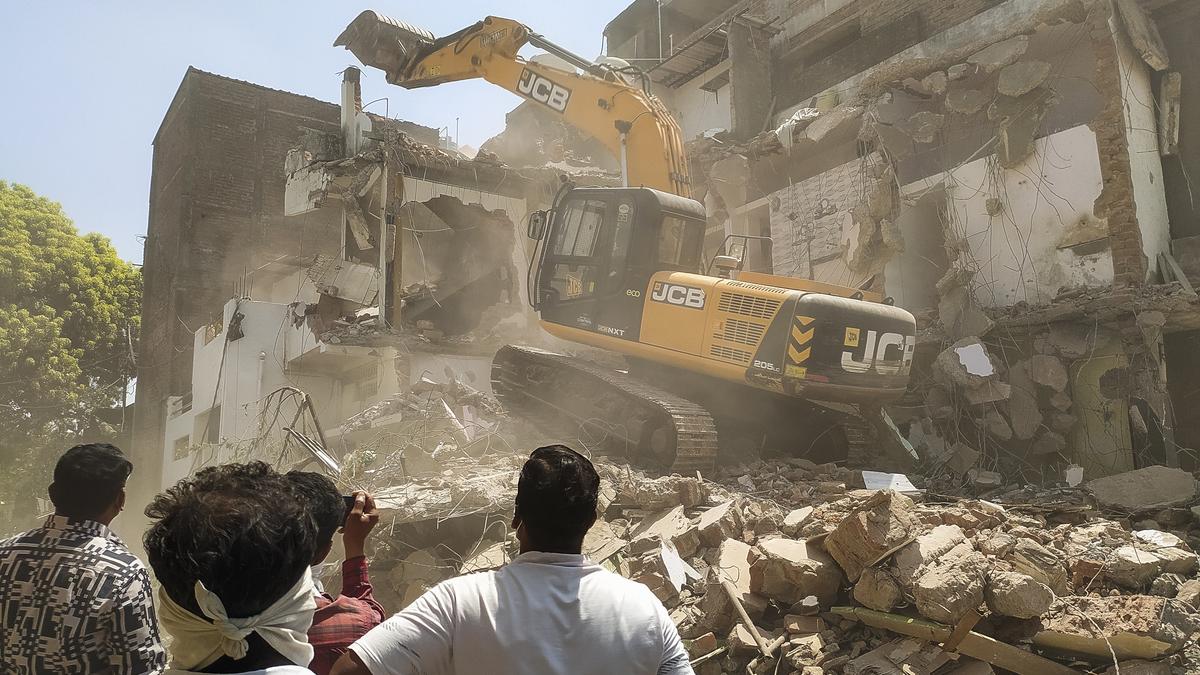
Nagpur authorities raze homes of violence accused, HC halts further demolition
The Hindu
Nagpur High Court criticizes NMC for demolishing properties of key accused in Nagpur violence case, sparking controversy.
The Nagpur Municipal Corporation (NMC) authorities drew flak from the Nagpur bench of the Bombay High Court on Monday (March 24, 2025) after they demolished the properties of two key accused in the Nagpur violence case. The Municipal corporation, under heavy police security, demolished the two-storey residence of Fahim Khan, a key accused in the March 17 communal violence, citing unauthorised construction. Officials also removed an illegal structure part of the residence of Yusuf Sheikh, another person linked to the unrest that erupted in the Mahal area.
The division bench of Justice Nitin Sambre and Justice Vrushali Joshi termed the civic body’s act ‘high-handedness’. “Why were the owners of the house not given a notice that the house was illegal? Why were they not given a hearing before the demolition of the property?” the division bench asked the corporation. While granting an interim relief to the petitioners, the court stopped further demolition of the properties. “Is the NMC targeting the petitioners based on their religion?” it asked.
The court was hearing a petition filed by Mr. Khan’s mother through advocate Ashwin Ingole who argued that the NMC’s move of demolishing their homes was selective enforcement. The petitioner also argued that the construction plans were approved in 2003 without any objections raised since then. The court has also sought a response from the NMC authorities and has listed the case for further hearing on April 15.
Mr. Khan, city president of the Minority Democratic Party (MDP), is among more than 100 people arrested in connection with the violence. He has been charged with sedition and is currently in judicial custody. The NMC officials said they had issued Mr. Khan a notice for building plan violations and for lack of formal approval “a few days back”.
The operation commenced at approximately 10.30 a.m. in the Sanjay Bagh Colony of Yashodhara Nagar, where three NMC excavators, accompanied by a large police force and drone surveillance, razed Mr. Khan’s house. The entire locality was sealed off for the duration of the exercise.
The civic officials confirmed that the property, registered in the name of Mr. Khan’s mother, was constructed on a Nagpur Improvement Trust (NIT) leasehold plot, the lease for which expired in 2020. They added that the structure lacked necessary permissions and was therefore considered illegal under the Maharashtra Regional and Town Planning (MRTP) Act. A 24-hour notice had been served ahead of the action.
Separately, a team of civic personnel demolished an unauthorised balcony at Mr. Sheikh’s residence in Johripura area of Mahal.

The sun is already high in the sky, beating down fiercely on our heads, when we reach Tipu Sultan’s Summer Palace in Chamrajpet, Bengaluru. But inside the beautiful high-ceilinged structure, it is surprisingly pleasant, the interiors airy and light-filled. According to a plaque outside the two-storied edifice made out of wood, stone, mortar and plaster, construction here was started by Hyder Ali Khan in 1781 and completed by his son, Tipu Sultan, in 1791, eight years before the Tiger of Mysore would be killed by the British in 1799.

 Run 3 Space | Play Space Running Game
Run 3 Space | Play Space Running Game Traffic Jam 3D | Online Racing Game
Traffic Jam 3D | Online Racing Game Duck Hunt | Play Old Classic Game
Duck Hunt | Play Old Classic Game










